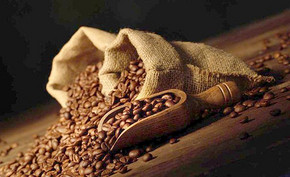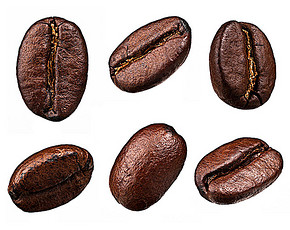The origin of Jamaican blue mountain coffee beans, a brief introduction to blue mountain coffee
Follow the caf é (Wechat official account vdailycom) and found that Beautiful Cafe opened a small shop of its own.
The top coffee in the world is Blue Mountain Coffee, which is regarded as a treasure because of its low yield. This precious coffee is named after its origin-a mountain in eastern Jamaica, which is surrounded by the sea. In fine weather, the sun shines on the blue Caribbean Sea, and the verdant mountains reflect the blue light of the sea. This mountain is named Blue Mountain. Blue Mountain is a very famous tourist attraction, the highest elevation is 2256 meters, is the first of the peaks in the Caribbean, located in the coffee belt of Jamaica. Blue Mountain has been loved by nature, once because of volcanic eruptions created here extremely nutritious land, coupled with the warm climate, not too much man-made development, here has grown the world's most famous and the world's most expensive coffee.

Blue Mountain Coffee is a model of many good coffee, full of fragrance, mellow, taste a little bitter, sweet for a long time. What deserves the attention of our consumers is that at present, the planting area in the Blue Mountain area is only 6000 hectares, which is not only used for growing coffee, but also sugar cane, bananas and cocoa. Therefore, not all the products billed as Blue Mountain Coffee are coffee originating from the Blue Mountain region. Today, most of the Blue Mountain Coffee we can buy on the market is not real Blue Mountain Coffee. The real Blue Mountain Coffee is made from pure Blue Mountain coffee beans ground and brewed without adding any sugar or milk. However, this kind of coffee is not only small, but also expensive, in order to satisfy the appetite, people can only keep trying to make an imitation similar to the taste of Blue Mountain coffee.
All the coffee trees of Blue Mountain Coffee grow on steep slopes, which is the secret of the mellow taste of Blue Mountain Coffee. Picking this kind of coffee is a difficult physical task, and only local female workers in Jamaica can afford this arduous task. At the same time, picking is a patient and careful work, which directly determines the quality of coffee, so women must choose coffee beans that are just ripe. Coffee beans must be picked and shelled on the same day, and then cleaned and picked after half a day of fermentation. The next step is to dry the treated coffee beans and spread them out on the cement floor or on a thick blanket to be exposed to sunlight. After drying to only 12%-14% moisture, they can be transferred to a place where coffee beans are specially stored. Wait until you drink it and then bake it and process it into powder. All of the above links are strictly controlled, and if anything goes wrong, it will destroy the taste and taste of the coffee.
Coffee has a long history in Jamaica, dating back to 1717, when King Louis XV of France was a coffee enthusiast. He not only planted coffee trees in his garden, but also ordered people to plant a large number of coffee trees in Jamaica. The large-scale cultivation of coffee in Jamaica began in the mid-1920s, when Sir Nicholas Lloyd, the governor of Britain in Jamaica, introduced Arabica seeds from Martinique, an overseas region of France, to Britain, and began to plant coffee in St. Andrews as a pilot project. Today's St. Andrews area has developed into a famous Blue Mountain Coffee producing area, together with Portland and St. Thomas producing areas and known as "the three major producing areas of Jamaican Blue Mountain Coffee". By 1932, Jamaica's annual coffee production had reached more than 15000 tons, reaching the highest level in the world.
In 1950, the Jamaican government established the Jamaica Coffee Industry Committee to better promote local coffee to the world, and to maintain the good quality of raw coffee and roasted coffee exported locally, it also issued a unique official seal for its coffee production and became the most authoritative national coffee organization in the world. Today, however, there are only a handful of six signs that can bear the banner of veritable Blue Mountain Coffee, namely, the Mafis River Embankment Coffee Factory, the Blue Mountain Coffee Cooperative Factory, the Portland Blue Mountain Coffee Co-operative Plant, the Coffee Industry Association, the Coffee Industry Association and Lanli.
Due to the influence of various factors, the coffee industry in Jamaica has fallen into a variety of dilemmas. The hurricane has led to a sharp decline in coffee production, rising labor costs, the rugged terrain and the inability to use machinery instead of labor. Many coffee growers are not well managed by retail investors. Just then, the Japanese seized the opportunity, and after injecting a lot of capital, Jamaica's coffee industry came back to life. Japan is of course the beneficiary, so they get the priority right to buy Blue Mountain Coffee. Today, 90% of Blue Mountain Coffee is in their hands. As a result, only 10% of Blue Mountain coffee is in circulation in other parts of the world, and Blue Mountain coffee has become rarer. However, regardless of whether it is high or low, Blue Mountain Coffee is very popular.
Important Notice :
前街咖啡 FrontStreet Coffee has moved to new addredd:
FrontStreet Coffee Address: 315,Donghua East Road,GuangZhou
Tel:020 38364473
- Prev

How to distinguish authentic blue mountain coffee beans?
Following caf é (Wechat official account vdailycom) found that Beautiful Cafe opened a small shop of its own. As we all know, Blue Mountain Coffee is famous all over the world. Unlike other coffee, Blue Mountain Coffee has reached a perfect balance among sweet, sour and bitter taste. It has no bitter taste at all, but shows a moderate sour taste. Coupled with a more mellow flavor, Blue Mountain Coffee is widely used.
- Next

Description of growing Flavor in Coffee producing areas of Tanzania
Follow the caf é (Wechat official account vdailycom) found that the beautiful cafe opened its own shop Kilimanjaro coffee in Tanzania, with soft acidity and attractive aroma, has long been loved by Europeans and ranked among the world's most famous coffee products. Europeans have given Tanzania a nickname for coffee gentleman, and Chinese coffee connoisseurs have compared it to Lanshan, the king of coffee.
Related
- Detailed explanation of Jadeite planting Land in Panamanian Jadeite Manor introduction to the grading system of Jadeite competitive bidding, Red bid, Green bid and Rose Summer
- Story of Coffee planting in Brenka region of Costa Rica Stonehenge Manor anaerobic heavy honey treatment of flavor mouth
- What's on the barrel of Blue Mountain Coffee beans?
- Can American coffee also pull flowers? How to use hot American style to pull out a good-looking pattern?
- Can you make a cold extract with coffee beans? What is the right proportion for cold-extracted coffee formula?
- Indonesian PWN Gold Mandrine Coffee Origin Features Flavor How to Chong? Mandolin coffee is American.
- A brief introduction to the flavor characteristics of Brazilian yellow bourbon coffee beans
- What is the effect of different water quality on the flavor of cold-extracted coffee? What kind of water is best for brewing coffee?
- Why do you think of Rose Summer whenever you mention Panamanian coffee?
- Introduction to the characteristics of authentic blue mountain coffee bean producing areas? What is the CIB Coffee Authority in Jamaica?

